Photos by Arnie Goodman
The Hollies were a tad underappreciated in the United States, though they had plenty of hits. We asked Graham Nash why he left the band and formed Crosby Stills & Nash, and the far-ranging answer included—among other things—late-night takeout, American citizenship, seeds and stems, Woodstock, “Woodstock” and Cass Elliot.
In 1965, the first time I came here to the US, I decided I was never going back. The Hollies were playing at the Paramount Theater, in New York. The first thing that happened, we just got in that morning, we took a cab to the hotel dropped off our stuff, we get to the Paramount Theater, and then we had to go straight to the theater for soundcheck.
No one had eaten, so the stage manager Bob—I can’t remember his last name ’cause it was 50 years ago—said, “So what do you want to eat?” I said, We don’t have time to go and eat. He said, “I know, tell me what you want to eat I’ll have it delivered.” What do you mean delivered? We can order food and people will bring it? You can eat at four in the morning. New things! There were those pencils with a little string, and if you want to sharpen it you just pull it off—silly things, but there we were, in America! America! I didn’t want to go back. I said Fuck, I’m never going back.
Elmore: If the Hollies had elected to stay in the US as well, would you have continued with the band?
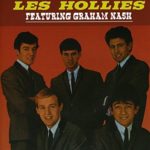 No, and I’ll tell you why. We had many, many hit records—five Top 10 records, and the band wanted to do an album of Bob Dylan songs [Nash sings sarcastically] How many years…. No. No! I can’t do that, turn Dylan’s music into fucking “Carousel” music. I’d written the song “King Midas in Reverse” for the Hollies, and it got into the Top 30, but not the Top 5, so they didn’t trust my musical direction. Then I wrote “Marrakesh Express,” and we tried to record it at Abbey Road, and it sucked. Somewhere back in the tape vault at Abbey Road there’s a tape that has the Hollies doing “Marrakesh Express,” and I hope you never hear it. We just started to differ, we were just drifting apart. With all due respect, there’s a difference between getting drunk and smoking dope, and I was smoking dope at that period.
No, and I’ll tell you why. We had many, many hit records—five Top 10 records, and the band wanted to do an album of Bob Dylan songs [Nash sings sarcastically] How many years…. No. No! I can’t do that, turn Dylan’s music into fucking “Carousel” music. I’d written the song “King Midas in Reverse” for the Hollies, and it got into the Top 30, but not the Top 5, so they didn’t trust my musical direction. Then I wrote “Marrakesh Express,” and we tried to record it at Abbey Road, and it sucked. Somewhere back in the tape vault at Abbey Road there’s a tape that has the Hollies doing “Marrakesh Express,” and I hope you never hear it. We just started to differ, we were just drifting apart. With all due respect, there’s a difference between getting drunk and smoking dope, and I was smoking dope at that period.
Elmore: Then how did you get together with David Crosby and Stephen Stills?
It was Cass Elliot. The Hollies were being thrown a party by our record company, Liberty Records, and this kid comes up to me and he knows everything about the Hollies, and he says, “After the party, what are you doing? I have this these friends who are recording down the road, they’re called The Mamas & the Papas, and they’re quite good.” I had seen their first album, and I’d seen Michelle [Phillips] and every red-blooded male wanted to fuck Michelle. I went to the session and was talking to Cass, who asked, “What are you doing tomorrow? I want to introduce you to a friend.”
She picked me up in a convertible Porsche, we went to a house was on stilts in Laurel Canyon and there was another Porsche there, and a beautiful big carpeted room with only one piece of furniture—a couch—and this fantastic sound system. And there’s this guy lying on the couch, and he’s looking at me, and he’s got a shoebox lid of dope, and he’s shaking it and he separating the stems from the seeds and rolling incredibly beautiful joints while keeping total eye contact, and that’s when I first met Crosby. Then Crosby later says, “Peter Tork’s having this party at his house on Mulholland, do you want to go?” and I said, Fuck yeah. I’m rocking!
So we go to Peter’s house, open the door, and all the smoke comes out of the room, and I hear this piano, this great piano kind of Cuban sound, and I said, Who’s this kid? Crosby said, “That’s who I want introduce you to. His name is Stephen Stills.”
David and Stephen were doing a little duo. David had been thrown out of the Byrds—you know David’s got a reputation of being a bit of an asshole—and [Buffalo] Springfield had broken up. Cass knew that the duo might need someone who would sing high harmony. David and Stephen talked to John Sebastian, and said, “We need a third, high voice here, what do you think?” John Sebastian—God bless him—said, “You have two choices. Either you get Phil Everly, or you get Graham Nash. That’s it.” What an incredible thing to say. So that’s how we started.
Joni’s [Mitchell] was the only witness to the very to the very birth of CSN. We blended our three voices into one and made this incredible sound—immediately, we didn’t have to rehearse. When I heard that sound I realized I had to change my entire life! I had to leave my equipment, I had to leave my band. I left my family, and I left my finances. I came to America with my jester mirror that I bought on Kings Road, an albino turtle shell that I liked, and my guitar. I came to America following that sound, and I never looked back.
Elmore: Is it true that you had not performed publicly before you went to Woodstock?
Not true. We had performed once, at the Chicago Auditorium Theatre, in August of ’69. We played that show, we drove to New York, we played Woodstock. It was only the second time we’d only appeared in front of anyone. When we were first approached to do it, we were told we’re going to do the show there was going to be maybe 40,000 people. And the next week it was like “No, there’s 200,000 people coming.” Remember Neil [Young] was at Woodstock, not very many people realize that.
Joni [Mitchell] was supposed to play Woodstock on the Sunday, which was the last show. On Monday, the very next day, she had The Dick Cavett Show, on television, and a big deal. David Geffen managed the four of us and Joni, and he said to her, “You can’t go to Woodstock, you’ll never get out of there, and you’ve got to do the The Dick Cavett Show.”
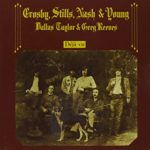 So when we got back to the hotel after Woodstock, and Joni and I were together, so was our suite with a piano in it, and she played “Woodstock.” She had written it that same day, when she wasn’t performing there. She was watching television and seeing what was going on, because it was major news. So when she played it for us it was a little slower, slightly more minor, and darker blue, if you know what I mean.
So when we got back to the hotel after Woodstock, and Joni and I were together, so was our suite with a piano in it, and she played “Woodstock.” She had written it that same day, when she wasn’t performing there. She was watching television and seeing what was going on, because it was major news. So when she played it for us it was a little slower, slightly more minor, and darker blue, if you know what I mean.
When she got to the end, Stephen said, “Joan, can we have that song?” She said, “Of course you can.” He said, “Can I change it?” So Stephen Stills is responsible for that record. It’s his arrangement, his idea of turning it into a rock song like that. And Joni, what a great writer, to be able to pinpoint exactly, without ever having been there.
On the Cavett Show, I was there, too—I’m not even sure that Neil was there—but you only see David and Stephen—I was standing behind the camera. Because of my visa, I couldn’t do television.
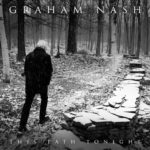 Learn more about Graham Nash HERE
Learn more about Graham Nash HERE
Buy the new album HERE
Find a performance near you HERE



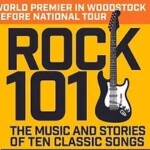

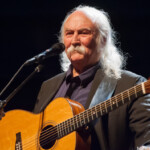

Great story